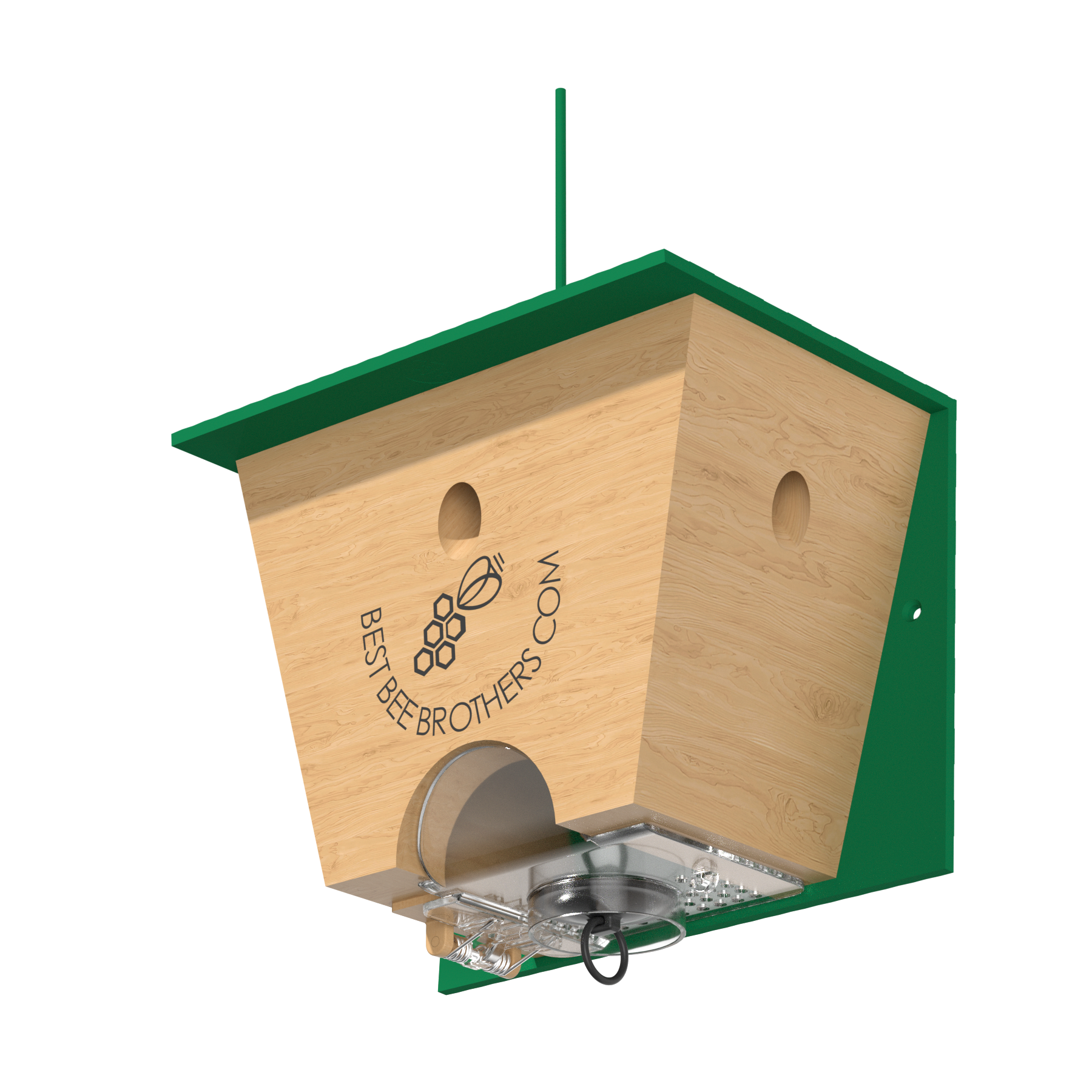When you think of bees, images of a beehive teeming with honey might come to mind. But the reality is that most bees do not make honey or live in hives.
In fact, 85% of the world’s bee population is made up of bees that do not live in hives or colonies. These creatures are also known as solitary bees. The most commonly known solitary bee is the mason bee.
Luckily, we can tell the difference between mason and carpenter bees because there are many physical and behavioral differences between the two.

There are many different types of mason bees. Pictured here is a red mason bee.
Mason Bee Nesting & Mating Habits
Unlike carpenter bees, mason bees look for naturally occurring gaps where they can build their nest chambers out of mud and other elements. They might even make their home in a vacant carpenter bee nest, but they won’t cause further damage.

It is common for gardeners to make nests for mason bees. Pictured here is a homemade nest.
Just like female carpenter bees, female mason bees do most of the work laying eggs and packing nests. As for the male mason bees, they do not protect their nests. They die off soon after mating. But male carpenter bees generally guard the exterior of their nests by dive-bombing predators and humans who come too close.
Mason Bees & Pollination
Allies in the garden, mason bees are excellent pollinators. Research shows they are actually better pollinators than honeybees. They typically stay close to their nests and carry the pollen dry on their underbelly coat. This allows the pollen to freely drop off and easily pollinate as they fly. Many commercial pollinators prefer mason bees for their efficient pollinating abilities, and it is said that mason bees are the answer to the honeybee crisis.
Carpenter bees are the exact opposite when it comes to pollinating. Instead, they are known as “nectar robbers” because they will use their mandibles to drink the nectar from the underside of the plant, and in many cases break the flower off.

Mason bees carry pollen mostly on their underbelly.
Mason Bee Characteristics
Physically, the mason bee is much smaller than the carpenter bee.
Carpenter Bee: Length of ½” to a 1½” in diameter around their abdomen
Mason Bees: Between ¼” to ½” in diameter around their abdomen
They are also fuzzy all over, whereas the defining characteristic of a carpenter bee is their bare, shiny abdomen.

Notice the mason bee’s fuzzy abdomen while the carpenter bee’s abdomen is bare and shiny.
Mason bees are excellent guests to have in your garden. They are docile bees that very rarely sting (male bees don't have stingers, only females). They tend to avoid people and stick with their business. Their excellent pollinating abilities make them a treasured flying friend. The destructive carpenter bee is much larger but easily handled with the right tools.
Looking to attract mason bees rather than carpenter bees? Take a look at our Bee Lodges, which are designed specifically for solitary bees.
With spring just around the corner, it’s not too early to get your carpenter bee traps and removal products up before the carpenter bee season! And remember, our traps only work on carpenter bees, and will not harm the helpful mason bee.









4 comments
Customer Support
@Dawn – No, the mason bees shouldn’t do too much structural damage. Mason bees look for naturally occurring gaps which means little to no damage. ~Best Bee Brothers
Dawn
Hi
I believe we have mason bees in our window and brickwork. I’m wondering if they will do any structural damage?
I have been leaving the window open for them, as if I close it I block their entrance. Just looking for advice on them.
Customer Support
@David – The bees you are describing don’t sound like carpenter bees which are our specialty. Since we don’t know what kind of bees they are, we do think a mason bee nest would help. This may prevent them from using your brickwork and giving them home without harming them. Nonetheless, we recommend speaking with other experts since this is not our specialty. ~Best Bee Brothers
David Sinnock
I have abees nest in the brickwork at the east facing side of our house.They appear to have removed some of the cavity insullation.The bees are thin and small and quite a large number. They do not appear aggresive and as we have a large natural grass paddock that I cut once a year I would not like to harm them if its not necessary.Can you give me some advice.The land is located high on the chalk grassland of the north downs with all the insects and wild life that goes with it.
Leave a comment
All comments are moderated before being published.
This site is protected by hCaptcha and the hCaptcha Privacy Policy and Terms of Service apply.